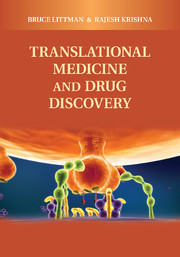Book contents
- Frontmatter
- Contents
- Contributors
- Preface
- Translational Medicine and Drug Discovery
- SECTION I TRANSLATIONAL MEDICINE: HISTORY, PRINCIPLES, AND APPLICATION IN DRUG DEVELOPMENT
- SECTION II BIOMARKERS AND PUBLIC–PRIVATE PARTNERSHIPS
- 8 BIOMARKER VALIDATION AND APPLICATION IN EARLY DRUG DEVELOPMENT: IDEA TO PROOF OF CONCEPT
- 9 IMAGING BIOMARKERS IN DRUG DEVELOPMENT: CASE STUDIES
- 10 EUROPEAN NEW SAFE AND INNOVATIVE MEDICINES INITIATIVES: HISTORY AND PROGRESS (THROUGH DECEMBER 2009)
- 11 CRITICAL PATH INSTITUTE AND THE PREDICTIVE SAFETY TESTING CONSORTIUM
- 12 THE BIOMARKERS CONSORTIUM: FACILITATING THE DEVELOPMENT AND QUALIFICATION OF NOVEL BIOMARKERS THROUGH A PRECOMPETITIVE PUBLIC–PRIVATE PARTNERSHIP
- SECTION III FUTURE DIRECTIONS
- Index
- References
12 - THE BIOMARKERS CONSORTIUM: FACILITATING THE DEVELOPMENT AND QUALIFICATION OF NOVEL BIOMARKERS THROUGH A PRECOMPETITIVE PUBLIC–PRIVATE PARTNERSHIP
Published online by Cambridge University Press: 04 April 2011
- Frontmatter
- Contents
- Contributors
- Preface
- Translational Medicine and Drug Discovery
- SECTION I TRANSLATIONAL MEDICINE: HISTORY, PRINCIPLES, AND APPLICATION IN DRUG DEVELOPMENT
- SECTION II BIOMARKERS AND PUBLIC–PRIVATE PARTNERSHIPS
- 8 BIOMARKER VALIDATION AND APPLICATION IN EARLY DRUG DEVELOPMENT: IDEA TO PROOF OF CONCEPT
- 9 IMAGING BIOMARKERS IN DRUG DEVELOPMENT: CASE STUDIES
- 10 EUROPEAN NEW SAFE AND INNOVATIVE MEDICINES INITIATIVES: HISTORY AND PROGRESS (THROUGH DECEMBER 2009)
- 11 CRITICAL PATH INSTITUTE AND THE PREDICTIVE SAFETY TESTING CONSORTIUM
- 12 THE BIOMARKERS CONSORTIUM: FACILITATING THE DEVELOPMENT AND QUALIFICATION OF NOVEL BIOMARKERS THROUGH A PRECOMPETITIVE PUBLIC–PRIVATE PARTNERSHIP
- SECTION III FUTURE DIRECTIONS
- Index
- References
Summary
The Biomarkers Consortium is a groundbreaking public–private biomedical research partnership managed by the Foundation for the National Institutes of Health (FNIH) (see Box 12.1) that endeavors to develop, validate, and qualify biomarkers to accelerate the development of new medicines and improve patient care.
The Consortium was founded in late 2006 by FNIH, the National Institutes of Health (NIH), the U.S. Food and Drug Administration (FDA), and the Pharmaceutical Research and Manufacturers of America (PhRMA). Other major stakeholders include the Centers for Medicare & Medicaid Services (CMS) and the Biotechnology Industry Organization (BIO). These stakeholders, and many others, are working together on an unprecedented scale to identify, develop, and qualify biomarkers that can be used to detect, prevent, diagnose, and treat disease. This integrated, cross-sector approach is helping to accelerate the use of biomarkers in research, development of treatments, and regulatory decision making.
The Consortium has more than 60 additional contributing members involved in helping to support its operations; these members represent the pharmaceutical and biotechnology industries, nonprofit organizations, and patient advocacy organizations. The biopharmaceutical members of the Consortium include Abbott Laboratories; Amgen; Amylin; AstraZeneca; Boehringer-Ingelheim; Bristol-Myers Squibb; Celgene Corporation; Daiichi Sanyko; Eisai, Inc.; GlaxoSmithKline; Johnson & Johnson; Eli Lilly and Company; Merck & Co., Inc.; Pfizer, Inc; F. Hoffman–La Roche, Ltd.; Sunovion; and Takeda Pharmaceuticals.
- Type
- Chapter
- Information
- Translational Medicine and Drug Discovery , pp. 295 - 300Publisher: Cambridge University PressPrint publication year: 2011



